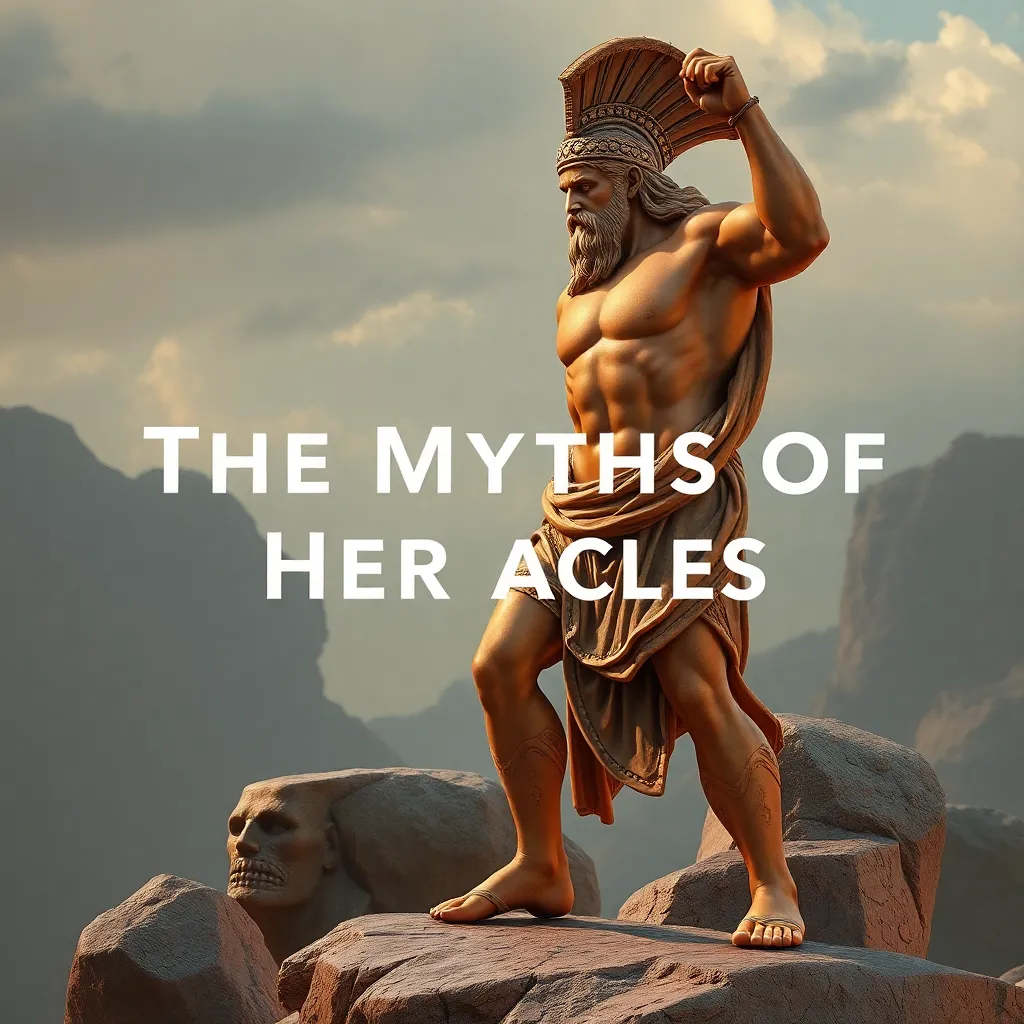The Myths of Heracles: Analyzing Key Themes and Motifs
I. Introduction
Heracles, known as Hercules in Roman mythology, stands as one of the most celebrated heroes in Greek mythology. His tales of strength, bravery, and resilience resonate through the ages, encapsulating the essence of what it means to be a hero. The myths surrounding Heracles not only provide thrilling narratives but also serve as a window into the values, beliefs, and cultural practices of ancient Greece.
Myths play a crucial role in understanding ancient Greek culture, offering insights into their worldview, social norms, and the complexities of human nature. This article aims to explore key themes and motifs in the myths of Heracles, shedding light on his journey and the lessons embedded within his stories.
II. The Hero’s Journey: Structure and Significance
The concept of the hero’s journey, popularized by Joseph Campbell, serves as a framework for understanding the narrative structure of many myths, including those of Heracles. This framework typically includes several key stages:
- The Call to Adventure: Heracles is called to undertake various labors and quests.
- The Trials: He faces numerous challenges that test his strength and character.
- The Return: After achieving his goals, he returns transformed by his experiences.
In Heracles’ narrative, these stages are significant as they highlight not only his physical feats but also his emotional and moral growth. The hero’s journey framework has profoundly influenced Greek storytelling, establishing a template that many heroes, both ancient and modern, follow.
III. Strength and Weakness: The Duality of Heracles
Heracles is often celebrated for his extraordinary physical strength, defeating formidable foes and completing impossible tasks. However, beneath this exterior lies a complex character marked by vulnerabilities and flaws. Heracles’ incredible might is juxtaposed with moments of rage, impulsiveness, and emotional turmoil, especially following the tragic events instigated by Hera’s jealousy.
This duality reflects the essence of human nature, illustrating that even the strongest individuals can possess weaknesses. Heracles’ struggles resonate with the human experience, reminding us that heroism is not solely defined by physical prowess but also by the ability to confront and overcome personal demons.
IV. The Role of Fate and Destiny
The influence of the gods is a recurring theme in Heracles’ life, representing the tension between fate and free will. From birth, he is marked by destiny—Hera’s wrath leads to his suffering and trials. This divine interference raises questions about predestination versus individual choice.
For instance, Heracles’ twelve labors, assigned to him as penance, illustrate the implications of fate. Each labor serves a dual purpose: a punishment for his past actions and a pathway to redemption. The nature of these tasks emphasizes how external forces shape one’s journey, even as the hero must navigate them through personal resolve.
V. Redemption and Punishment: A Cycle of Suffering
Heracles’ tragic backstory is pivotal to his character. After being driven mad by Hera, he unwittingly kills his wife and children. This act of violence propels him into a cycle of suffering and penance as he seeks redemption through his labors.
The consequences of his actions serve as moral lessons, emphasizing themes of accountability and the possibility of redemption. Through his trials, Heracles learns valuable lessons about humility, courage, and the importance of making amends for one’s past. This cyclical nature of suffering and redemption is central to his mythos, illustrating the complexities of the human condition.
VI. The Nature of Heroism: Beyond Physical Might
Heracles challenges the traditional notions of heroism that prioritize physical strength. His journey reveals that true heroism encompasses emotional intelligence, moral choices, and the ability to empathize with others. Unlike many heroes who rely solely on brute force, Heracles often demonstrates compassion and wisdom.
When compared to other mythological heroes, such as Achilles or Odysseus, Heracles’ story emphasizes the importance of inner strength and moral integrity. His willingness to confront his flaws and seek redemption sets him apart, redefining heroism in a more holistic manner.
VII. The Influence of Heracles on Modern Culture
The legacy of Heracles extends beyond ancient mythology, permeating literature, film, and art. His stories have inspired countless adaptations, reflecting the enduring fascination with his character and the themes he embodies. Works such as Disney’s animated film “Hercules” and various literary retellings highlight his adventures while introducing modern audiences to the complexities of his character.
In contemporary society, Heracles serves as a symbol of resilience and strength in the face of adversity. The themes of redemption, personal growth, and the struggle against one’s demons remain relevant, resonating with audiences who seek inspiration from heroic narratives.
VIII. Conclusion
In conclusion, the myths of Heracles encapsulate key themes and motifs that are foundational to understanding both ancient Greek culture and the human experience. From the hero’s journey and the duality of strength and weakness to the intricate interplay of fate and free will, each element contributes to a rich tapestry of storytelling.
Heracles’ enduring legacy as a complex hero continues to inspire and provoke thought, emphasizing that heroism transcends mere physical might. As we reflect on these myths, we find that their lessons remain relevant, offering guidance and insight into our own lives and struggles.




